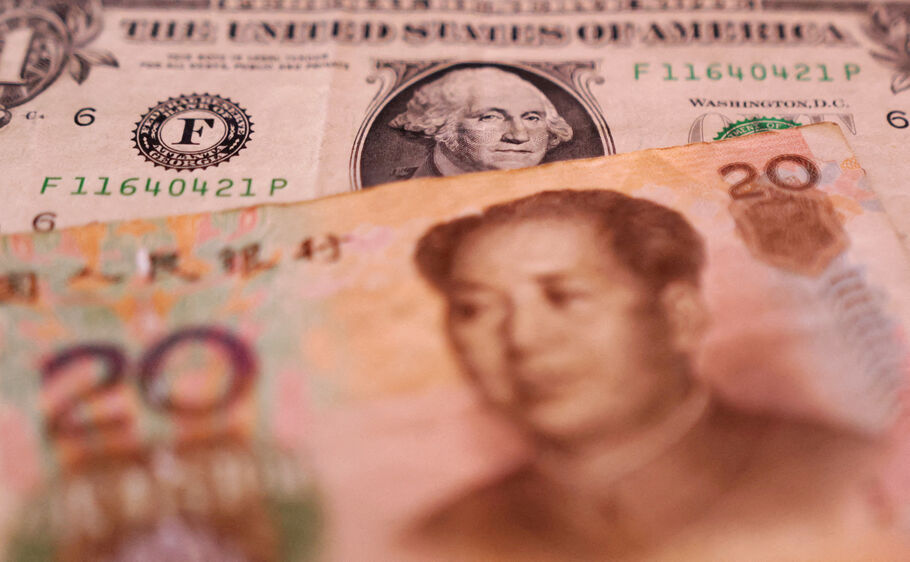[Reuters Analysis] China uses yuan as olive branch in US trade talks: McGeever

By Jamie McGeever
ORLANDO, Florida, Sept 3 (Reuters) - A notable trend this year has been the often-counterintuitive market reactions to U.S. President Donald Trump's efforts to upend many long-held economic norms. One of the biggest surprises has been the appreciation of China's yuan.
The consensus opinion at the start of the year was that Beijing would counter Washington's punitive tariffs on Chinese imports by depreciating the yuan against the dollar. This would keep Chinese goods competitive, enabling the country's exporters to compensate for any loss of U.S. business.
On top of that, a weaker exchange rate would, in theory, help to reflate China's economy, pulling it out of the deflationary funk it has been in since its property bubble began to burst in 2021.
And, finally, a weaker yuan would be a poke in the eye to Washington. A key pillar of the Trump administration's economic agenda, articulated most artfully by adviser Stephen Miran and Treasury Secretary Scott Bessent, is a weaker dollar.
But Beijing surprised everyone.
The yuan did slide to an 18-year low around 7.350 per dollar during the chaos of Trump's April 2 'Liberation Day' tariffs. And combined with low domestic inflation and even deflation in recent years, the yuan's broad 'real' effective exchange rate (REER) is the weakest in over a decade.
But since April, it has reversed course rapidly against the dollar, trading last week at a 2025 high of 7.1260 per dollar.
Indeed, measured by the People's Bank of China's official daily fixings or offshore market trading, the yuan just posted its biggest monthly gain against the greenback in almost a year.
These big moves can partly be explained by strong capital inflows. The Shanghai Composite equity index is at a 10-year high, boosted by record net inflows from hedge funds in August. And even though China's trade surplus with the U.S. may be shrinking, its global surplus in the first seven months of the year hit a new record.
That's a recipe for a stronger exchange rate.
GOOD FAITH
But with a currency as tightly controlled as the yuan, market dynamics are not the whole story.
The appreciation appears to be a deliberate policy choice by Beijing, potentially hinting at its broader strategy in combating Trump's tariffs.
On a basic level, this doesn't make sense. Given the deflationary pressures still weighing on the Chinese economy, why do authorities appear to be actively pursuing a stronger exchange rate?
But when viewed as a negotiating tactic, the logic starts to become clear. The Trump administration has explicitly stated that it wants a weaker dollar – not a 'weak dollar', mind you – but a currency level that would make U.S. exports more attractive. And Beijing can help deliver this, especially given that China's currency acts as an anchor for other regional exchange rates.
Thus, the yuan's appreciation against the dollar indicates that – despite China's show of force this week – Beijing is still willing to negotiate with Washington.
'ANTI-INVOLUTION'
China may also want a firmer exchange rate to help ease some domestic concerns, namely sluggish consumption.
The economic data coming out of China will do little to support consumer sentiment or domestic demand: the latest headline manufacturing PMI data was soft, new orders are declining, and construction has contracted at its fastest rate since the pandemic.
President Xi Jinping is clearly taking this seriously. He has pledged to take steps to boost domestic consumption and technological innovation, while supporting small firms. And he has also spoken about breaking the cycle of "involution", a term now widely used for excess competition and overcapacity.
An appreciating yuan should help these efforts because, as all else being equal, a stronger currency should boost domestic demand.
The yuan's recent rise against the dollar is thus "a policy push, not a market pull," as Goldman Sachs analysts neatly put it.
And given the foreign and domestic concerns China currently faces, investors should not be surprised if Beijing keeps pushing the currency higher, at least until the latest U.S.-Sino tariff truce expires in November. A stronger yuan may be one olive branch Beijing is still willing to offer.
(The opinions expressed here are those of the author, a columnist for Reuters)
China struggles to lift home prices
Chinese yuan vs U.S. dollar
Yuan FX rate and PBOC trading band
Chinese Yuan's Real Effective Exchange Rate








